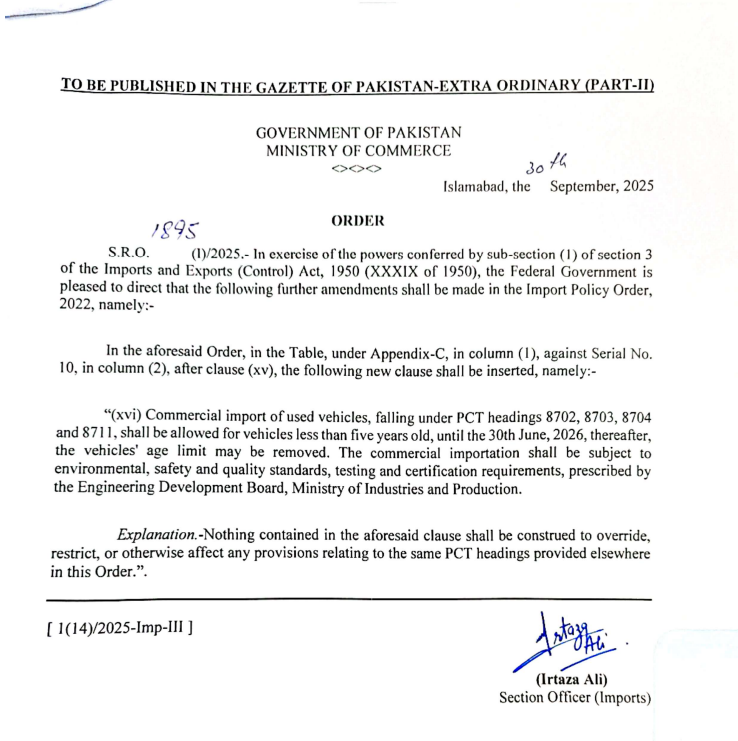Government Legalizes Commercial Used Car Imports in Pakistan
On September 30, 2025, the Ministry of Commerce of the Government of Pakistan issued S.R.O. 1895(I)/2025, amending the Import and Export (Control) Act, 1950.
This order legalizes the commercial import of used cars, making it a part of Pakistan’s legal system. Prior to this, the policy had been discussed widely, but without official confirmation. Now, with the issuance of this SRO, it has been integrated into the law.
Here’s the snapshot of the order:

However, several important questions arise regarding this amendment. Continue reading as we explore the key details and gaps in the new policy.
What’s in the Order?
The SRO allows the commercial import of used vehicles that are classified under these specific PCT codes:
- 8702: Buses, vans, MPVs (10 or more passengers)
- 8703: Passenger cars (sedans, hatchbacks, SUVs)
- 8704: Goods transport vehicles (pickups, trucks, delivery vans)
- 8711: Motorcycles
What is a PCT Code?
A PCT Code is a unique number used to classify goods for import and export under the Harmonized System (HS), a globally recognized system used by customs authorities around the world to simplify international trade.
Five-Year Limit Until 2026
According to the order, vehicles less than five years old can now be commercially imported until 30th June 2026. After this date, the age restriction will be removed, allowing older vehicles to be imported under the same category.
Vehicles Must Meet Environmental and Safety Standards
The SRO also stated that all imported vehicles must meet environmental, safety, and quality standards. These will be checked and certified by the Engineering Development Board (EDB).
However, the current order does not specify under which standard EDB will test the car. It is also unclear how the government plans to implement this testing.
Missing 40% Duty
Earlier, in a social media channel, the Finance Ministry had claimed that an additional 40% duty would apply to these imports, with the duty phasing out by 2029.
However, the current SRO makes no mention of this duty, creating a contradiction between policy statements on social media and the legal order.
No Licensing Details
The SRO legalizes commercial imports but provides no framework for:
- Which individual, dealer, or business can import
- Licensing requirements to become a commercial importer
- Registration procedures to become authorized commercial importer
This gap makes the order incomplete in terms of execution
What This Means for Stakeholders
For Dealers and Importers:
Pricing remains a significant question mark. Without precise details on the duty, it’s tough to predict the final cost of vehicles or set fair margins. This leaves considerable room for uncertainty in business planning.
For Buyers:
While there’s a chance of finding more affordable cars, the uncertainty around taxes and standards could lead buyers to hesitate. Many might wait for the government to clarify these details before making a purchase.
For Local Car Manufacturers:
Imported cars could soon flood the market, intensifying competition, especially if the government doesn’t impose the promised 40% extra duty on commercial imports. This would put significant pressure on local car manufacturers, making it harder for them to compete in the market.
For now, Pakistan’s new used car import policy is more of an outline than a finished framework. Until duties, licensing, and testing standards are clarified, businesses and buyers remain in a state of uncertainty.



Comments are closed.